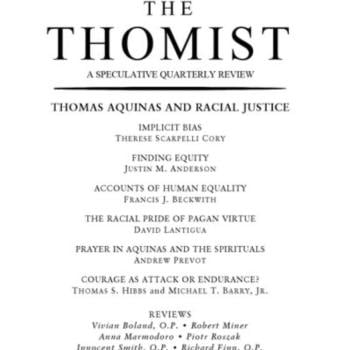One of the great blessings of my career as a professor is being invited to speak at the many chapters of the Thomistic Institute found on college campus throughout North America and Europe. Over the past year I have spoken at the University of Miami, the U.S. Military Academy at West Point, University of Toronto, and Universidad Panamericana in Mexico City. In 2025 I am set to give lectures at the University of North Florida and New York University.
One of the standard talks I give is sometimes entitled “Moral Relativism and the Natural Law.” This month the Thomistic Institute, in its newsletter Send Contra, published an essay adapted from one of the transcripts of that talk. (Parts of this lecture were adapted from portions of two of my published essays: “Moral Relativism: Arguments For and Against,” in The New Apologetics, ed. M. Melson (Word on Fire, 2022), and Francis J. Beckwith, “Catholicism and the Natural Law: A Response to Four Misunderstandings,” Religions, 12.6 (2021)). Here’s how the Sed Contra essay begins:
I begin with these two sets of propositions. The first set consists of some moral rules, with which everyone is familiar.
•Love your neighbor as yourself.
•Thou shall not commit adultery.
•Do not intentionally kill the innocent.
•Do not take what is not yours without permission.
•Parents ought to care for their infant children.
•Shun ignorance.
•Live at peace with your neighbors.
•One ought not to rape.
The second set consists of some immoral rules.
•Your guilt or innocence in a criminal trial depends entirely on your race and not on a judge or jury’s
deliberation on legitimately obtained evidence.•Anyone may be convicted of a crime based on the results of a coin toss.
•The maximum punishment for first degree murder is an all expense paid vacation to Las Vegas.
•Government contracts are to be distributed based on family connections and bribes and not on the quality of the bids.
•Original parenthood is to be decided by a special board of experts appointed by the governor and not on whether one sires or begets the child.
Now if you believe that the moral rules or the immoral rules, or perhaps others not mentioned, ought to be obeyed or disobeyed by everyone regardless of time, place, circumstance, or culture, then you are a moral objectivist. The term “objectivist” has a variety of different meanings, but here, it is simply the view that morality is something that is true and real apart from what you subjectively desire or what your culture teaches.
On the other hand, if you believe that morality depends exclusively on one’s time, place, or culture—that there is no universal objective morality that transcends society and circumstance—then you are a moral relativist. You do not deny that there are moral rules, but what you believe is that these rules are nothing more than your own society’s ethical code, which may be different, but no better or worse, than another society’s ethical code. In that case, you believe that morality is more like the rules of etiquette.
There are two arguments that are often employed to defend relativism. The first is based on empirical observation, and essentially states that there’s just too much diversity on moral issues both in and across cultures. The second is a type of social peace argument, whose advocates maintain that it is intolerant to believe that one’s moral views are universally true while others are wrong. I will call the first the argument from disagreement, and the second the argument from tolerance.
You can read the rest of it here.













